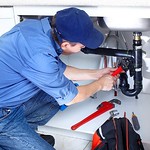How to Fix Slow or Clogged Drains in Portsmouth?
What are the Causes of Slow or Clogged Drains in Portsmouth and How to Fix Them?

Image credit: Flickr
Portsmouth has some of the worst drains in the United Kingdom. One of the main causes for this is that it’s built on a shallow marshland. The water levels change constantly and drains get plugged easily, which can cause flooding in homes.
There are many ways that you can try to fix your own clogged drain. Pouring boiling water down the pipe in order to dissolve any stuff that is blocking it, using a plunger or using a snake, you can fix a clogged drain by yourself. Contacting your local council or qualified plumber to do it, if you’re unsure what to do.
The most effective way of fixing the problem is by contacting professionals who have experience with fixing these clogs and blocked drains, such as Portsmouth City Council or Portsmouth-based drainage service providers like Emergency Plumber Portsmouth.
How to Prevent and Speed Up Drain Cleaning in Portsmouth?
The issue of slow drain cleaning is becoming a pressing concern as it affects our daily lives. The most common problem that people encounter is when they have to wait up to six hours to clear a simple blockage. The solution comes down to speeding up how drain cleaning services are delivered in Portsmouth.
The introduction provides background on why this section topic exists and what are the keywords that will help readers understand what the article is about.
Drain Cleaning In Portsmouth Pro Tips
Obstructed pipes may occur a back-up of water. This can happen for a variety of reasons, including the following:
-
The sink is on the upstairs of your home
-
The toilet is in your downstairs bathroom
-
A clogged pipe is at the top of a wall, near the ceiling
-
An old or damaged property line or an improperly installed or damaged drain cover.
-
It is at the bottom of a wall, near the floor.
-
A clogged sewer line is located on the side of your home.
-
A toilet overflow pipe is located on the outside of your home
What is the Best Way to Clear a Blockage from a Drainpipe?
Blocked toilet in home is a common problem that many homeowners usually face. It is not really a difficult issue to deal with, but can be frustrating if you don’t know how to go about it.
When you face a blocked toilet, the first thing that you should do is to run some water down the drainpipe and see the result. If so, you may need to try flushing your toilet again a couple of times until it clears up. In case this doesn’t work, then the next step would be using a plunger or stopper to unblock your toilet.
If things still remain blocked in your home, then enlist the help of a professional plumber who will clear out any blockages for you.
What Are Signs of a Blocked Drainpipe?
A blocked drainpipe can be a serious issue and is often the result of an accumulation of dirt and other debris. It can also lead to overflows in the bathroom, kitchen, or laundry room.
If you’ve noticed that your drains are slowly but surely getting clogged, it’s probably time to call a professional to come out and rectify the issue.
Roots from trees and shrubs growing into a drainpipe. A crack on top of the pipe that might have just appeared or been there for years.
A very small hole on the pipe that might just be a droplet or might indicate some other damage to the pipe.
How to Prevent Slow or Clogged Drains in Portsmouth by Keeping Them Clean?
Drains are a necessity in every home. Keep them clean and free of debris to prevent clogged drains that lead to slow or flooded sinks and tubs.
These tips can help you prevent slow or clogged drains in your Portsmouth home:
-Keep the toilet lid down to prevent flies from getting into the pipes.
-Don’t put grease, oil or fat down the drain because they harden into a solid material that blocks the pipes.
-Don’t pour your food scraps down the sink because they can also clog up your drain.
-Backwash the kitchen garbage disposal periodically to prevent build-up of food material in the pipes.
-Rinse off fruit and vegetables before consuming.
-Keep a lid on your trash can when not in use to reduce odor.
-Cut up food into small pieces to minimize the amount of food waste generated.
-Compost food scraps instead of sending them to the landfill or incinerators.